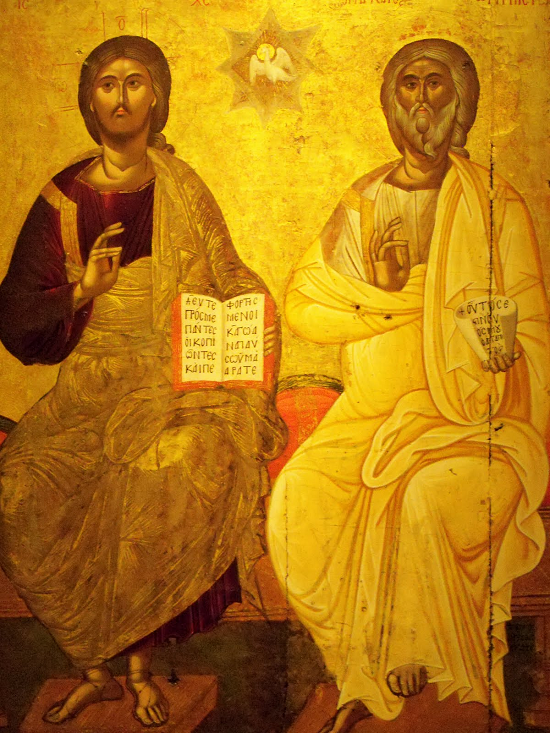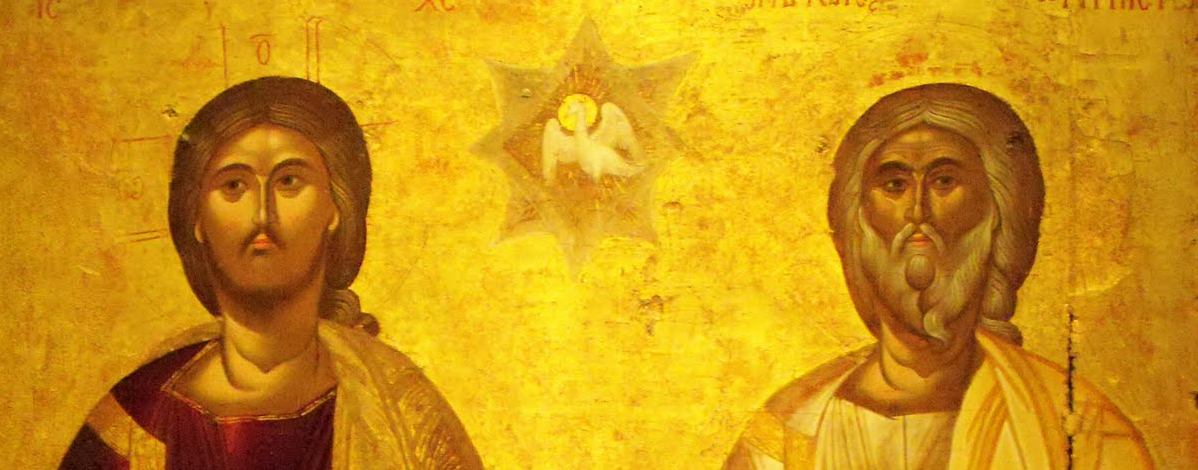A Matter of Life and Death
Solemnity of the Holy Trinity Scripture Readings

Although today’s readings from our Scriptures have been selected as illustrations of the Solemnity of the Holy Trinity, you may find it curious that the Holy Spirit is mentioned only in passing. It appears as a blessing in today’s second reading, from Saint Paul’s letter to the Corinthians, a blessing that we use at the beginning of each of our Eucharistic Liturgies: “The grace and peace of the Lord Jesus Christ, and the love of God and the fellowship of the Holy Spirit be with all of you.”
I can only think of two reasons why the Holy Spirit doesn’t hold a more prominent place in today’s readings: 1) we just completed our celebration of the Solemnity of Pentecost in which we focused our attention on the Holy Spirit, and 2) we’re invited to ponder how the Holy Spirit—the life-force of all that is—provides the connection between the Father and the Son, and the Son and the Church. As we explore today’s readings, pay attention to how the unseen Spirit empowers the Holy Trinity as well as our relationship with it.
In our first reading from the Book of Exodus, God reveals to Moses his Name. Since they understood that knowing a person’s name gives you the power to summon them, the Israelites strictly obeyed the commandment not to take God’s name in vain. They refused even to speak it, lest they summon God in vain. In the written text, they added the vowels of Adonai (Lord) to the consonants of God’s name. That extreme reverence for the Name explains why, even in our English translations of the Hebrew Scriptures, we find God’s proper name replaced by the word Lord, printed in all capital letters. We’re not attempting to summon God to do our bidding, so, while respecting the sacredness of God’s Name, that is, Yahweh, we will not be afraid of using it. That’s why when I read today’s first reading, I spoke God’s name appropriately—after all, this is the very text in which God reveals his Name to Moses and the Hebrew people.
There is a tremendous difference in perspective between the attitude of the people in the Hebrew Scriptures that held God aloof and unapproachable and our Christian gospels that show God establishing an intimate relationship with us. It all hinges on the person of Jesus, the only Son of the Father, who is Yahweh God.
Turning now to our gospel reading, Scripture scholars are not of one mind regarding the speaker of this passage. Some say that it’s a continuation of Jesus’s discourse from the preceding paragraphs, where he’s explaining to Nicodemus how the Messiah must die to give life to the world. Others believe that this is John the Evangelist breaking into the narrative to provide a commentary on how the death of the Messiah would express the connection between the Father and the Son, and the Son and the world. Either way, since the passage was composed long after the events it describes, it’s inevitable that the experiences of the early Church after the Resurrection would color how John wrote about it.
We’re talking about the love of Yahweh God for his people. God sent his Son—God spoke his eternal Word—into human history. Think about it. It’s God’s very nature to reveal himself. What else is Creation all about? The philosophers as the question, “Why is there something rather than nothing?” The answer to that question can be found in the Name of God itself: Yahweh—“I cause to be what is.” Even we humans can understand that without Creation, God makes no sense at all. And the reverse is equally true: without God, Creation makes no sense at all. Creation simply means God revealing himself. So, what does it mean to reveal yourself? What does it mean to let someone else know who you really are? Isn’t that an act of vulnerability? An act of love? Didn’t God show his vulnerability when he revealed his Name to Moses?
“God so loved the world that he gave his only Son.” In short, God so loved that he spoke his Word—he revealed himself. He gave his being, he gave his life, he gave his love, he gave his Name, he gave his Son—the very image, the icon of who God is. When we consider the Holy Trinity, God the Father is always the revealer, the speaker, the giver, the lover. The Son, likewise, is the Word, the spoken, all that has been given, all the love incarnate in all that is. The Spirit of God, as we saw at Pentecost, is the verb: the revealing, the speaking, the giving, and the loving. The Spirit is the life-force behind and within all that is. Why is that giving so important for God? Why did God need to give his only Son, and why is it important for us?
It’s important for God because Creation—everything that is—is not God. All existence can be logically divided into God and not-God. God is eternal. Not-God is temporal. All that we call “Creation” comes into existence and passes out of existence. That’s the nature of change. Regardless of what model we adopt to help us interpret the nature of the universe, that one fact remains—whatever comes into existence, passes out of existence. Even from the perspective of the eternal universe theory, everything within the universe still obeys the same law. Only God is timeless, changeless, and eternally the same.
We ought to be thinking of the temporary nature of created things when we read the words of the gospel that say, “…so everyone who believes in him might not perish…” From this perspective, for us to perish must mean to pass out of existence as who we are—in other words, to lose our identity. Who we really are and are meant to become is defined by our connections: our connection to our God, our connection to each other, and our connection to our true selves. As we acquire those connections, we establish our identity. Should we lose those connections, we would lose ourselves…and the persons we were always meant to become would pass out of existence forever. We would perish. It’s only through our connection with God incarnate in our world through the power of the Holy Spirit that we truly live—as Saint Paul writes, that it is no longer we, the perishable, who live, but Christ, the eternal, who lives in us. [cf. Galatians 2:20]
God does not pass judgment. God does not condemn. God simply wants us to become the people we were meant to be. God invites us to join with his Son in the Holy Spirit. We’re free to accept God’s invitation to connect with him, or not. We’re free to follow the example of Christ and bring healing into our world. Or we’re free to ignore the invitation and choose to isolate ourselves in selfish self-interest. So long as we’ve accepted God’s invitation, our connection with God and one another in the Spirit cannot be broken, even by physical death. But isolation from God and one another also means isolation from our true selves. In isolation, we’re not truly alive, and whatever identity we imagined we had will not survive. We would indeed perish. God’s judgment has always been the same. We’re the agents of our own judgment. Yahweh God says to each one of us, “I call heaven and earth today to witness against you: I have set before you life and death, the blessing and the curse. Choose life, then, that you…may live.” [Deuteronomy 30:19]
Get articles from H. Les Brown delivered to your email inbox.
